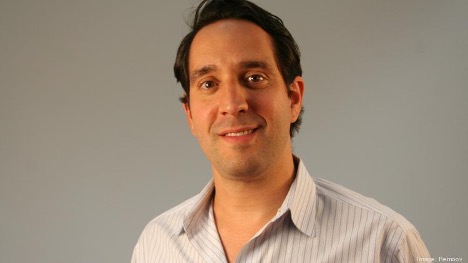
Remoov CEO and founder Luis Perez saw opportunity in the pandemic, seized it and hauled it to the bank, or the dump.
REMOOV
IN THIS ARTICLE
By Brian Rinker – Staff Reporter, San Francisco Business Times
Mar 5, 2021
When Covid-19 led to the shutdowns last March, Luis Perez thought his junk hauling startup, Remoov, might be toast. But then he saw a golden opportunity to grow revenue by clearing out the offices abandoned in the Bay Area.
“We did a switch where we started doing a lot more of the corporate clients, and that was a big thing for us,” said Perez.
Perez describes his San Francisco startup simply as, “We collect anything that people want to sell, donate, and dispose,” and ever since it was founded in 2014 it had focused largely on residential clients.
But as companies began leaving their offices behind in droves, whether they were going remote or out of state, Perez was able to train his business on these new clients and in the process more than double the company’s 2020 revenue, going from $1 million the year prior to $2.5 million. The company’s growth was also fueled by residents, having been set free to live anywhere by the work-from-home phenomenon, were leaving the city for more affordable areas.
In addition, Perez noted, his company benefited from people also just staying put.
“When you spend a lot of time at home, you start realizing how much of a mess it can be, or you decide that you want to start upgrading some of your furnishings or some of your electronics,” Perez said.
Remoov is not the typical junk hauler, it offers high-touch services for its clients, using technology that quickly automates the appraisal and resale process of preowned items, allowing for what Perez calls “fluid pricing.”
“We essentially have some algorithms that depending on the demand and the current pricing, it sets the price for items,” he explained.
And whatever Remoov sells, whether on its own online marketplace or others, it gives its clients half. Everything else is recycled, donated or junked.
“You can think of us as a combination of white glove consignment with donations and junk removal,” he explained.
The business has been funded by Perez’s own money, small angel investments and the revenue it generated. It wasn’t until 2019 that he raised a small $1.5 million seed round, and in 2020, extended the round for another $1 million.
The company, which went through the accelerator program at 500 Startups, operates in the Bay Area and Phoenix, but with its growth last year he is hoping to expand to tech hot spots like Seattle, Denver, San Diego, Los Angles, Austin and Dallas, he said. By the end of this year, or early 2022, he aims to raise a Series A in the $15 million range. Remoov employs 18 full-timers and 15 contractors. It has storage warehouse in South San Francisco to house all the item up for sale.
Perez said he built the business upon the premise that getting value for your pre-owned items is “a pain in the butt.”
“The options that you really have is, either DIY, which is Craigslist or Facebook,” he said. But what people usually do is put their stuff in storage. And it’s not really other junk haulers, like the Junk King or 1-800-GOT-JUNK, that he sees as his main competitor, it’s the storage industry, he said.
But worse than putting stuff in storage, is when people just junk it, he said.
“It is horrible. It’s bad for the environment, bad for your pocket, bad for the economy,” he said
Here’s how it works. A typical customer will submit photos or text all the stuff they want removed to the company’s website. In few hours, Remoov will shoot them an estimate, detailing what items can be re-sold, donated or junked. The clients can then click on a link and schedule a pick-up appointment.
Remoov will sell what items it can on its own online marketplace but it will also sell on various other marketplaces if needed. For example, music items might be sold on Reverb and furniture on Chairish.
“Our goal is to become the experts for the secondary goods market, so that we can automatically know what’s what has value, what doesn’t and through what channel should be sold,” he said.
And because Remoov can take its time selling a client’s items, it can usually get more money for them, which it gives half back to them.
Pricing starts at $199 for 1/8 of a 25-foot moving truck and can go all the way up to $10,000 for large offices. The average pickup, Perez said, is $400, which he says is cheaper than a typically junk removal.
Doing this work, and watching the purchasing trends on Remoov’s online marketplace, Perez has had a front row seat of how the pandemic has rolled out for white collar workers, which can be broken down into three phases:
- Phase 1: Work from home (desks, office chairs, office lamps, monitors)
- Phase 2: Turn your home into a gym (treadmills, steppers and weights)
- Phase 3: Upgrading home design: (sofas, dressers)
Perez said today it’s “less about survival and working from home” and more about making homes more pleasant, as they settle in for the long haul, with new furnishing and electronics.
